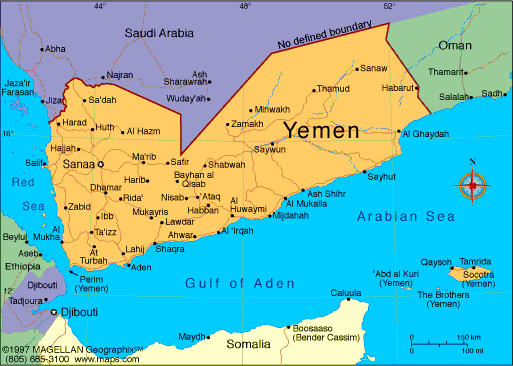
Throughout history, Aden has been known as a city of tolerance because of its composition of many different races and religions. Despite this diversity, the city has experienced very little, if any racial discrimination or even religious persecution. Mosques were built next to churches, solidifying Aden as an attractive place where different cultures and dogmas could coexist.
A specific group, Indian immigrants, whose influence in Aden still permeates today can be traced back to their forced removal from their south Asian nation.
Many Yemenis, of Indian origin, still remember when they first came to the southern Yemen’s commercial center in 1839 when Britain, led by Captain Stafford Bettesworth Hains, occupied Aden with his forces. Most Indian immigrants were serving as slaves or soldiers for the British army. To this day Aden still has a significant Indian population as a result of this, according to the historian Najeeb Yabeli.
The Indian slave labor was responsible for much of the infrastructure that still exists today. They were used to construct buildings and factories in Aden. They were also an important part of the armed forces. Due to Aden’s proximity to the Indian Ocean, British occupiers established an affiliate Indian army that settled in Aden’s Cratr area.
In 1850, when the British opened up Aden’s harbor to free markets there was a need for judiciary, police, health and educational institutions and human resources to run them. Indians were summoned for the jobs, as much of Aden’s native population remained illiterate, according to Yabeli.
Yabeli points out that the majority of the Indian newcomers were Muslims, which helped them integrate themselves in society and enabled them to marry local Yemenis. Soon there was an area in Cratr called the Indian Neighborhood as the recently incorporated population became part of the local residents’ daily lives.
The Indians’ influence can be seen in the architecture of Aden as well as the food, music, and local slang. An example of such a widely-eaten, Indian food delicacy is zorbian, a spicy rice dish mixed with meat. Such expressions like “Khabar Dal,” which means “don’t do it again”, “Banis,” which translates as “cold water” and “Shoki,” or “the police” are all one-time Indian phrases now used commonly.
Yabeli says there are many well-known residents of Indian decent that have moved their way up to well-respected positions in society. The Manars, a widely recognized family that runs to the renowned Aden Commercial Institute, the Lalejis, who operate a printing business, Hassan Ismail Khadabkhish, a contractor and a member of the Legislative Council, and his brother Hussein Khadabkhish, the owner of the National Cinema in Aden were all listed to illustrate the historian’s point.
Local Indians assist the Popular Resistance Movement’s fighters
Amr Wagdi Anwar, an actor and a producer is of Indian origin, said when the Popular Resistance Movement emerged to combat the British’s occupation, some of the Indians who had been displaced by the foreign forces, joined the cause that eventually kicked the imperialists out in 1964.
Anwar said some Indians in Aden returned to India after the city’s independence, while others preferred to stay because of the families and businesses they had established.
Those that remained with beliefs in Hinduism were free to practice their religion and construct temples; others maintained an Islamic identity because of intermarriage.
Despite the religious diversity Anwar says there were no acts of religious discrimination immediately following the British’s departure.
Social prejudices arise
Mustafa Anwar Ibrahim, a member of the Lalji family, whose relatives were relocated to Aden at the hands of the British, said that it was easy for his grandparents to live in Aden at that time, saying, “People had to treat the Indians kindly because they became part of the people in Aden. However, in the 90s, discrimination began to rear its ugly head as result of influences from the North.
Yabeli agrees with Ibrahim.
“Discrimination arose in Aden when the northern tribesmen brought their discrimination to Aden after the tragic war in 1994.” Yabeli criticizes these practices saying they go against Islam’s teachings.
Indians began to feel the crunch as well as native Southerners who did not feel connected to the North, according to Ibrahim, pointing out that the South’s lands and wealth were plundered by the officials in the North.
“People suffered from marginalization, so unity for them is meaningless,” said Ibrahim, who no longer thinks unity between the two regions is possible due to a lack of justice.
Despite some tensions that have surfaced Aden has a proud record of small businesses started by Indians. Research conducted by the academic, Amal Aiash, on the Indian people in Aden, details one of the most ancient Indian families in Aden – Mohammed Balo Abdulkareeem’s family. When Balo came to Aden he lacked an education, but had made a living selling kebabs back in India. He started a successful small restaurant that his grandchildren still run today. Three generations have carried on Balo’s legacy.
“Though I don’t make a huge profit, I’m pleased to live here in Aden among my family and relatives,” Mohammed, Balo’s great-grandson, said.





